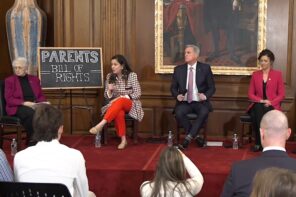Is the Tea Party a religious movement? Last week here at RD, Lou Ruprecht said no, while I said it’s not so simple.
For the Mormon sector of the movement (including Tea Party icon Glenn Beck), I explained, the Tea Party taps into a powerful and distinctive complex of Mormon beliefs about the divinity of the U.S. Constitution and the last-days role of righteous souls from the Rocky Mountains in saving it from destruction.
An even more provocative explanation of the specifically religious features of the Tea Party in the Book of Mormon belt comes from Doe Daughtrey, a doctoral candidate in religious studies at Arizona State University.
According to Daughtrey, especially in the last three or four decades, institutional Mormonism has deemphasized or discontinued some distinctive metaphysical doctrines and practices dating from our faith’s early connections with Anglo-American folk magic and mysticism. This demystification of Mormonism results in large part from LDS Church leaders’ pragmatic desire to evangelize and establish the faith more effectively beyond the religion’s American Western ethnic core.
But this “disenchantment” or “secularization” has left many multi-generational Mormons longing for the intensity of our old identity as “peculiar people.”
Daughtrey writes:
In a secularized, routinized, or demythologized Mormonism (which looks more like mainline Protestantism than the mystical tradition established by Joseph Smith), the religion is missing that distinctiveness, that tension of persecuted otherness. Beck and the Tea Party movement reenchant the experience of being Mormon . . . or at least they reawaken the Mormon cultural memory of prophetic millennialism.
Beck, a convert to Mormonism, recalls the strident prophetic voice that distinguished Mormonism from 19th-century Protestant groups. Many Mormons have a long cultural memory of persecution. Though they may welcome their church’s modern emphasis on their similarities to other religionists, I believe there remains a longing in them for the ‘peculiar people’ identity conveyed by the divisive prophetic voice and the historical experience of conspiracy.




